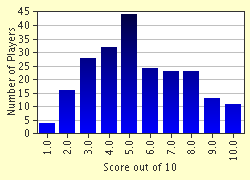Quiz Answer Key and Fun Facts
1. On October 14, 1964, this Soviet leader was forced into early retirement by the Politburo, paving the way for Brezhnev's emergence as the leading Soviet official. Name this former leader.
2. Which of the following was a slogan of the Brezhnev years?
3. During the Brezhnev years, 'samizdats' (aka self-publications) became a popular way for dissidents to express their dissatisfaction with the government. Which of the following was a popular dissident publication?
4. In 1974, this Nobel prize winner for literature was deported from the Soviet Union because of his Western publication of "Gulag Archipelago." He had been a prominent figure in the Russian dissident movement. Who was he?
5. This man was head of the KGB during the Brezhnev years and became his successor. Who was he?
6. An old Soviet joke describes how Stalin, Krushchev, Brezhnev, and Gorbachev were all aboard the train to socialism, and it breaks down. Each proposes a solution to the problem. Which of the following was Brezhnev's solution?
7. During the Brezhnev years, the average Soviet citizen had access to more consumer goods than at any other time to date.
8. During the Brezhnev era, the Soviet Union would send troops into Afghanistan. In what year were troops first deployed?
9. In 1968, Brezhnev authorized the military crackdown on the reform movement taking place in Czechoslovakia. What is the name given to the events of 1968?
10. In 1968, he wrote a tract entitled "Reflections on Progress, Coexistence, and Individual Freedom." He is also a famous physicist who played a crucial role in Soviet development of the hydrogen bomb. Who was he?
Source: Author
allieetal
This quiz was reviewed by FunTrivia editor
bloomsby before going online.
Any errors found in FunTrivia content are routinely corrected through our feedback system.

